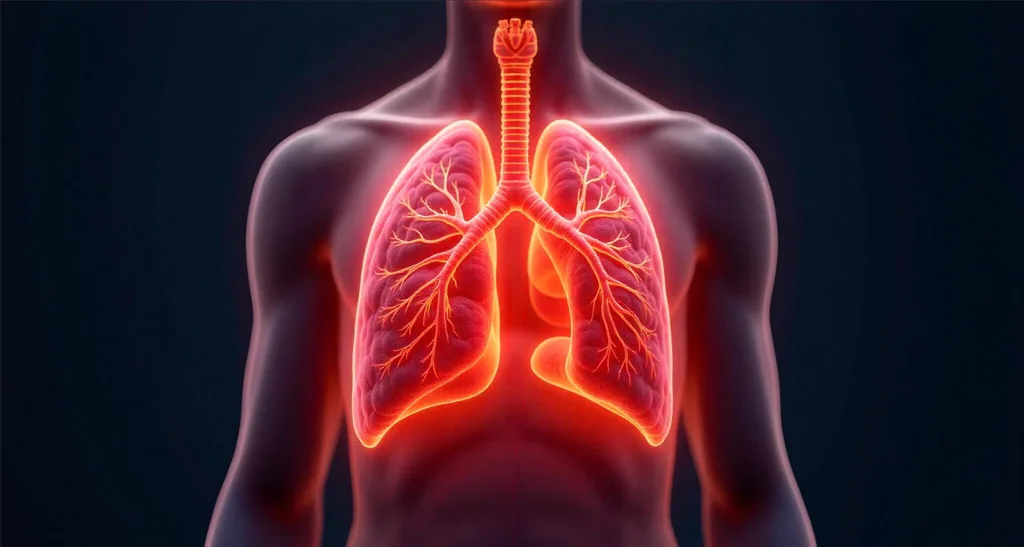Empyema, a serious condition characterised by the accumulation of pus in the pleural space, is often closely associated with various lung complications. This article aims to explore the intricate relationships between empyema and other pulmonary issues, shedding light on their interconnected nature and implications for patient care.

The Relationship Between Empyema and Pneumonia
Pneumonia, an infection that inflames the air sacs in one or both lungs, is one of the most common precursors to empyema. According to a study published in the European Respiratory Journal, approximately 5% of patients hospitalized with pneumonia develop empyema as a complication [1].
Mechanism of Development
- Bacterial invasion: Pathogens from pneumonia can spread to the pleural space.
- Inflammatory response: The body’s immune reaction can lead to fluid accumulation.
- Progression: If left untreated, this fluid can become infected, leading to empyema.
Empyema and Lung Abscesses
Lung abscesses, pockets of pus within the lung tissue, can both cause and result from empyema. A retrospective study in the Journal of Thoracic Disease found that 15-20% of patients with empyema also had concurrent lung abscesses [2].
Key Points:
- Abscesses can rupture into the pleural space, causing empyema.
- Empyema can lead to the formation of abscesses if not properly managed.
- Both conditions require aggressive treatment to prevent further complications.
The Connection Between Empyema and Pleural Effusions
Pleural effusions, the accumulation of excess fluid in the pleural space, are closely linked to empyema. In fact, empyema can be considered a type of complicated parapneumonic effusion.
Progression from Effusion to Empyema:
- Simple parapneumonic effusion
- Complicated parapneumonic effusion
- Frank empyema
A meta-analysis published in Chest revealed that early intervention in complicated parapneumonic effusions could prevent progression to empyema in up to 70% of cases [3].
Recent Advancements in Understanding and Treatment
Recent research has provided new insights into the management of empyema and its related complications:
- Biomarkers: A study in the European Respiratory Journal identified specific biomarkers that can predict the progression from pneumonia to empyema with 85% accuracy [4].
- Minimally invasive techniques: Video-assisted thoracoscopic surgery (VATS) has shown promising results in managing both empyema and its complications, with shorter hospital stays and fewer post-operative complications compared to open procedures [5].
- Targeted antibiotics: Advances in microbiological testing have allowed for more precise antibiotic selection, improving treatment outcomes for both empyema and associated infections [6].
Conclusion
Understanding the intricate connections between empyema and other lung complications is crucial for effective patient management. Early recognition, prompt intervention, and a multidisciplinary approach are key to improving outcomes and reducing the risk of long-term sequelae.
Frequently Asked Questions (FAQs)
Q1: What are the early signs of empyema?
A1: Early signs of empyema may include:
- Fever and chills
- Chest pain that worsens with breathing
- Shortness of breath
- Dry, nonproductive cough
- Fatigue and general malaise
It’s important to note that these symptoms can be similar to pneumonia, highlighting the need for proper medical evaluation.
Q2: Can empyema resolve on its own?
A2: Empyema rarely resolves on its own and typically requires medical intervention. Treatment usually involves a combination of antibiotics and drainage of the infected fluid. In some cases, surgery may be necessary.
Q3: How is empyema diagnosed?
A3: Diagnosis of empyema typically involves:
- Physical examination
- Chest X-ray
- Computed tomography (CT) scan
- Thoracentesis (a procedure to remove and analyze pleural fluid)
- Blood tests to check for signs of infection
Q4: What is the difference between empyema and pleural effusion?
A4: While both involve fluid in the pleural space, empyema specifically refers to the presence of pus. Pleural effusion is a broader term that includes any excess fluid in the pleural space, which may be clear, blood-tinged, or purulent (as in empyema).
Q5: Are there any long-term effects of empyema?
A5: Potential long-term effects of empyema can include:
- Reduced lung function
- Pleural thickening
- Chronic pain
- Increased susceptibility to future respiratory infections
Prompt and appropriate treatment can significantly reduce the risk of these long-term complications.